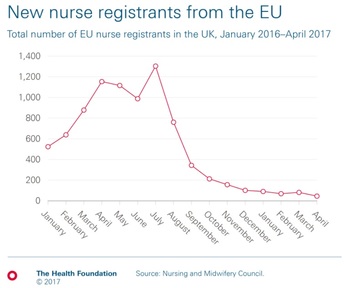UK sees over 90 per cent drop in EU nurses since Brexit
Since the referendum on Brexit last year, the number of nurses from the EU registering to practise in the UK has dropped by 96 per cent.

The Health Foundation obtained figures from a Freedom of Information request to the Nursing and Midwifery Council (NMC). It found that 1,100 EU nurses came to work in the UK last April, but this fell to just 46 EU nurse registrants in April this year.
Anita Charlesworth, director of research and economics at the Health Foundation, said: "The recruitment and retention of nurses is one of the biggest challenges facing health and social care, with a shortage of 30,000 nurses in England alone.
"The drop in EU nurses registering to work in the UK could not be more stark – just 46 registered to work in the UK in April. Without EU nurses it will be even harder for the NHS and other employers to find the staff they need to provide safe patient care. The findings should be a wake-up call to politicians and health service leaders.
"Clearly action is needed to offset any further loss of EU nursing staff in the near future. But the overall shortage of 30,000 nurses is not a shortage caused by the Brexit vote. The chronic shortage of nurses is the result of years of short-term planning and cuts to training places. A sustainable, long-term approach to workforce planning is desperately needed."
Almost half of care workers leave their job within a year
Health and social care are major contributors to the wider economy – accounting for around one in 10 jobs.
But according to a report published by the House of Commons Communities and Local Government (CLG) in March, nearly half of care staff leave their jobs within a year of starting due to low pay, poor employment terms and conditions, lack of training and lack of opportunities for career progression.
As a result, the use of agency staff in care homes has risen by over 55 per cent in the last two years and the UK has repeatedly turned to international recruitment as a ‘stop gap measure’ to fill staffing shortages.
Specialist property advisers Christie + Co, claim that the ‘agency culture’ has put 'huge financial pressures' on care homes, with the cost of agency staff typically exceeding the cost of regular staff by over 100 per cent on a per hour basis.
Shortage of nurses

Mario Kreft, chair of Care Forum Wales, has called for fundamental changes to tackle the shortage of nurses in the independent sector in Wales.
He spoke out after care provider, HC-One, revealed in 2014 that two of its care homes in the Bridgend area were closing.
He said: “We know there are major issues affecting the care sector in Wales, particularly in care homes registered for nursing.
“The owners of the two homes in Bridgend have been quite clear that for them the overriding issue was the lack of nurses, the inability to recruit enough nurses of the right calibre.
“That is something that is reflected across Wales. It should be recognised that the commissioning arrangements make it very difficult to attract people to work in the sector.”
To close the gap between demand and supply, Christie + Co suggest the following:
• The industry needs to significantly optimise the way nurses and care practitioners deliver care
• Every measure needs to be undertaken to entice nurses to enter or re-enter the industry and keep them from leaving
• The number of funded university places needs to be substantially increased
• Immigration needs to be encouraged and the barriers to overseas recruitment reduced.
Leaving the EU
Continued public sector pay restraint, and changing the way care is delivered to meet changing needs will continue to test the resilience of the workforce and the availability of services. But the challenge has been made even harder while the implications of the UK leaving the EU remain unknown.
In January 2017, the number of applications for nursing degrees by people from other EU countries was reported to be 25 per cent lower than in January 2016. Similarly, 3,500 nurses with EU nationality left the NHS in 2016 – twice as many as in 2014.
These risks are even greater in social care, which is more reliant than the NHS on staff from the EU. About seven per cent of social care staff (around 90,000 people) are from the EU, compared with five per cent of NHS staff.
Sustainability of the NHS

Janet Davies, chief executive of RNC, says the absence of a comprehensive, national strategy to secure the appropriately skilled, well-trained and committed workforce over the next 10–15 years is the biggest internal threat to the sustainability of the NHS.
She said: “The Government’s refusal to guarantee the status of EU nationals living in the UK is exacerbating shortages.
“Our nursing workforce is in a state of crisis across our health service, from A&E to elderly care and this puts patients at serious risk.
“These figures should act as a wake-up call to the Government as they enter Brexit negotiations. EU staff should be left in no doubt that their contributions are welcome and valued.”
carehome.co.uk jobs
Chair of carehome.co.uk jobs, Davina Ludlow, advises both nurses looking for a job and care homes wishing to recruit nurses to use the carehome.co.uk jobs board, which lists over 4,000 care home and nursing home jobs in the UK.
She said: “carehome.co.uk jobs has a wide selection of health, nursing and social care jobs ranging from posts for managers to nurses as well as care home chefs and gardeners.
“With a database of over 50,000 CV’s from people actively seeking a job in the care sector, we also provide a valuable resource for anyone looking to recruit a care professional.”
For more information on carehome.co.uk jobs go to: www.carehome.co.uk/jobs/
Latest Features News
 25-Nov-19
2019 Election: Boris Johnson leaves social care in 'too difficult box' but Labour vows to end 'crisis'
25-Nov-19
2019 Election: Boris Johnson leaves social care in 'too difficult box' but Labour vows to end 'crisis'
 18-Oct-19
Podcast: Wendy Mitchell and dementia: 'My biggest fear is not knowing who my daughters are'
18-Oct-19
Podcast: Wendy Mitchell and dementia: 'My biggest fear is not knowing who my daughters are'
 27-Sep-19
Exclusive: Care minister backs care workers' call for time off to grieve and attend funerals
27-Sep-19
Exclusive: Care minister backs care workers' call for time off to grieve and attend funerals
 19-Sep-19
Podcast: Gyles Brandreth says poetry helps ward off dementia
19-Sep-19
Podcast: Gyles Brandreth says poetry helps ward off dementia
 30-Aug-19
Edinburgh Fringe funnyman joins comics facing toughest audience at care home gig
30-Aug-19
Edinburgh Fringe funnyman joins comics facing toughest audience at care home gig